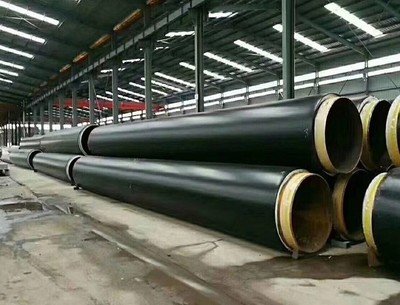The insulation pipe is mainly composed of three layers, one layer is a protective shell made of high-density polyethylene or fiberglass, one layer is an insulation layer made of rigid polyurethane foam, and a layer of working steel pipes, which can be transported according to the medium. Welded steel tubes, seamless steel pipes, and double-sided submerged arc spiral steel pipes are used for different requirements.
Advantages of thermal insulation steel pipe
1. Prefabricated direct-buried thermal insulation steel pipes do not need to build huge trenches, and only need to bury the thermal insulation pipes underground, so the project area is greatly reduced, which can reduce the amount of earth excavation, reduce the amount of masonry and concrete, and not only protect The environment can be improved, and the construction period can be effectively shortened. Moreover, the parallel construction of thermal insulation steel pipes and on-site trenching can also complete the project faster.
2. The heat loss of thermal insulation steel pipe is only 25% of that of traditional steel. Because of its good thermal insulation performance, long-term operation can significantly save energy and reduce costs.

3. Due to its thermal insulation properties, the thermal insulation steel pipe also has good corrosion resistance and impact resistance at low temperatures, and can work normally in underground frozen soil.
4. The thermal insulation steel pipe has good waterproof and anti-corrosion capabilities, and can be directly buried in the ground or in water without fear of low temperature environments. The construction is faster and the cost is effectively reduced.
5. It is inconvenient to check the steel pipe after it is buried, but the thermal insulation steel pipe can be equipped with an alarm system to automatically detect the leakage fault of the pipe network, accurately indicate the fault location and automatically alarm.
6. The service life of thermal insulation steel pipes can generally reach 30-50 years, and the daily maintenance cost is relatively low. Compared with the service life of ordinary steel pipes, the cost can be further reduced.
The thermal insulation pipe has excellent characteristics such as good heat insulation, flame retardant, anti-corrosion, high strength, light bulk density, sound insulation, cold resistance, no water absorption, and simple and quick construction. Now it has become an indispensable paving material for thermal insulation, anti-corrosion and waterproof in transportation, chemical industry, refrigerated construction, petroleum, electric power, and other industries.
Advantages of thermal insulation steel pipe
1. Prefabricated direct-buried thermal insulation steel pipes do not need to build huge trenches, and only need to bury the thermal insulation pipes underground, so the project area is greatly reduced, which can reduce the amount of earth excavation, reduce the amount of masonry and concrete, and not only protect The environment can be improved, and the construction period can be effectively shortened. Moreover, the parallel construction of thermal insulation steel pipes and on-site trenching can also complete the project faster.
2. The heat loss of thermal insulation steel pipe is only 25% of that of traditional steel. Because of its good thermal insulation performance, long-term operation can significantly save energy and reduce costs.

3. Due to its thermal insulation properties, the thermal insulation steel pipe also has good corrosion resistance and impact resistance at low temperatures, and can work normally in underground frozen soil.
4. The thermal insulation steel pipe has good waterproof and anti-corrosion capabilities, and can be directly buried in the ground or in water without fear of low temperature environments. The construction is faster and the cost is effectively reduced.
5. It is inconvenient to check the steel pipe after it is buried, but the thermal insulation steel pipe can be equipped with an alarm system to automatically detect the leakage fault of the pipe network, accurately indicate the fault location and automatically alarm.
6. The service life of thermal insulation steel pipes can generally reach 30-50 years, and the daily maintenance cost is relatively low. Compared with the service life of ordinary steel pipes, the cost can be further reduced.
The thermal insulation pipe has excellent characteristics such as good heat insulation, flame retardant, anti-corrosion, high strength, light bulk density, sound insulation, cold resistance, no water absorption, and simple and quick construction. Now it has become an indispensable paving material for thermal insulation, anti-corrosion and waterproof in transportation, chemical industry, refrigerated construction, petroleum, electric power, and other industries.









